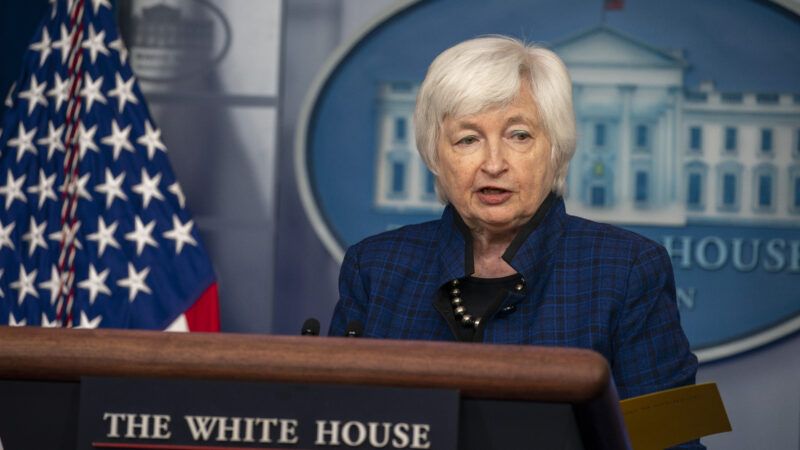Janet Yellen Sells Big Business on Big Government
The treasury secretary told the Chamber of Commerce that an activist government funded by higher corporate taxes would be a boon for business too.
|

( CNP/AdMedia/Newscom)
U.S. Treasury Secretary Janet Yellen came out swinging against small government today in a speech intended to sell business leader on President Joe Biden's massive $2.3 trillion American Jobs Plan and the corporate tax hike that'll be needed to pay for it.
"For decades, the prevailing focus has been on the need to decrease and then limit the size of government as a share of the economy," said Yellen in remarks before the U.S. Chamber of Commerce. "This approach to U.S. fiscal policy, founded on a distrust of government motives and effectiveness, along with resistance to higher taxes, has had profound effects on our nation and our people."
Anyone paying attention to ever-growing federal spending and the national debt might be confused by the supposed era of fiscal restraint Yellen is describing.
Yellen concedes that spending on entitlements, like Medicare, Medicaid, and Social Security, has only continued to grow, as has military spending. But increased largesse on those particular budget priorities, when combined with a supposed consensus about shrinking the size of government, says Yellen, means that "discretionary spending has been compressed as a consequence."
Yellen caveats this point, too, by saying that "exceptions have been made, most often in the form of temporary support for the economy following shocks and in times of recession."
Non-defense discretionary spending—which includes federal outlays for transportation, education, and low-income support programs—spiked in response to the Great Recession and, particularly, during the pandemic. In between these two crises, however, that particular slice of federal funding did fall to a post-1962 low when compared to the size of the overall economy, according to the progressive Center for Budget and Policy Priorities.
If one focuses just on non-defense discretionary spending part of the budget, it looks almost like we've been living in a small government paradise, argues Yellen, saying "ambitious and valuable initiatives like the Affordable Care Act engendered enough controversy to foreclose at that time the possibility of broadening the agenda."
Yellen goes on to list a number of ills resulting from this supposed fiscal restraint, including deteriorating, out-of-date infrastructure, an education system that hasn't kept up with technological change, and a lack of support services for families, including childcare. Big picture problems like economic inequality and climate change have only gotten worse in the absence of an activist, ever-growing government, she adds.
"That is why the President proposed the American Jobs Plan and the American Families Plan," says Yellen. "These policies will promote a dynamic economy with greater opportunity for workers, higher living standards, and, over time, reduced inequality."
The massive increase in federal spending envisioned in both plans—and the corporate tax increases the administration is pushing to pay for it—will also be a boon for business, Yellen told the chamber, saying, "We are confident that the investments and tax proposals in the Jobs Plan, taken as a package, will enhance the net profitability of our corporations and improve their global competitiveness."
The promise of increased corporate profitability is obviously a necessary ploy to get the business community on board with the Biden administration's agenda. Yellen went much further in her remarks by arguing for a permanent expansion of the size and scope of the federal government.
"It is the time to recommit our government to playing a more active and smarter role in the economy. The administration's planned actions are not fiscal stimulus in the way we have seen in the past," she said. "Nor are they intended to target a particular size of government."
Yellen's remarks fit squarely into what the Wall Street Journal's Greg Ip has termed "Bidenomics," which calls for massive federal spending aimed at reshaping the economy and society without heeding traditional concerns about inflation, deficits, and the potential "crowding out" of private investment.
Interestingly enough, the details of the American Jobs Plan fall short of the expansive vision Yellen outlined in her speech. Biden is relying on a corporate tax hike to cover the entirety of the $2.3 trillion in American Jobs Plan spending in an effort to keep his promise not to raise taxes on Americans making under $400,000 a year. To make that math work, the spending will have to sunset after eight years, while those corporate taxes will have to last for 15 years.
Yellen's remarks, however, seem to suggest that Biden's budget gimmickry has much more to do with political expediency than any real desire on the part of the administration to pay for its spending proposals or have them lapse eventually.
The era of small government has been over for a while. The only question now is what constraints government will impose on itself absent a healthy fear of excessive government debt.
